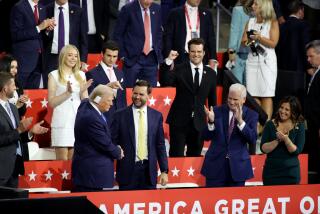A BALKAN ACCORD : Two Leaders Met Alone at End--and Found Peace : Balkans: Talks came down to a deal cut by Serbian and Croatian presidents and accepted by Bosnian counterpart.
The four barracks, austere brick buildings normally used to shelter transient Air Force officers, faced onto a bare quadrangle that was alternately scoured by blustery winds and glazed by snow.
And for eight days, the atmosphere inside the Bosnia peace talks was bleaker still. Bosnian, Serbian and Croatian delegations were kept apart under virtual house arrest, each confined to a separate barracks and allowed to communicate only through Secretary of State Warren Christopher and his aides, in the fourth building.
Again and again, the Americans trudged across the quadrangle--offering proposals, cajoling, even threatening the participants in an increasingly desperate search for a breakthrough. Finally they decided to bring Serbian President Slobodan Milosevic and Croatian President Franjo Tudjman face to face--but only with U.S. officials present as referees.
To their surprise, Milosevic countered with a request to meet Tudjman alone. The Americans assented.
Hours later, as Christopher gazed glumly out at the empty patch of snow, Milosevic and Tudjman appeared. Shoulders hunched against the cold, they were coming to report a joyless success.
It was not that they had resolved their differences, President Clinton said later in an interview. Or that they had somehow found the road to a bright future. The disagreements, the mistrust, the old animosities remained unchanged.
“But in the end, they just decided they could not walk away from this,” Clinton said.
Less than 24 hours before Clinton announced the peace accord Tuesday, it looked very much as though the marathon 21-day negotiations at Wright-Patterson Air Force Base here had been for naught.
Ultimatum Given
After a false start early Monday morning--and a long day of intensive bargaining--Christopher had laid down a marker: Either the three sides come to a deal by 10:45 p.m. or the United States would shut down the talks.
By 11:30 p.m., however, it was clear that the deadline was to come and go without agreement. A despondent U.S. delegation sent a draft announcement to each of the three factions housed in the Spartan red-brick barracks: The talks would come to a close at 11 a.m. Tuesday. What happened then would be anyone’s guess.
On Tuesday morning, the answer was: success. Two of the leading players--Milosevic and Tudjman--had worked out a compromise on the final sticking point and, in a last spurt of personal diplomacy, Christopher had persuaded Bosnian leader Alija Izetbegovic to go along.
A few minutes later, a clearly worn-out Christopher bumped into Milosevic in a hallway and conveyed the good news: Izetbegovic had agreed. After 21 days of negotiations, they had a deal. Milosevic, at first surprised, clearly was pleased. “Fantastic!” he exclaimed, breaking into a smile.
So ended a 14-week U.S. peace initiative.
Although State Department spokesman Nicholas Burns insisted later that the talks had been undramatic--”There was very little histrionics,” he told reporters, and “nobody walked out”--chief U.S. negotiator Richard Holbrooke recalled that the negotiations had been like “a roller-coaster,” laden with emotion and marked by seemingly endless ups and downs.
The peace talks had begun on a blustery afternoon Nov. 1, when the three presidents gathered at Wright-Patterson. The atmosphere was businesslike and somber. At Christopher’s prodding, the heads of the three factions shook hands.
Intensify the Pressure
The negotiations were modeled after the “proximity talks” that led to the Camp David accord in 1978. Although the leaders of Israel and Egypt both stayed at Camp David, the presidential retreat in Maryland, they did not negotiate with each other directly. President Jimmy Carter served as intermediary between the two.
In Dayton, much of the mediators’ job involved a form of psychological warfare. For days, they would intensify the pressure, peppering the three sides with proposals and pushing the negotiations late into the night. Every few days, they would break the tension with a game of tennis or soccer.
When an impasse seemed particularly difficult, the mediators called in Christopher, an experienced negotiator who applied the pressure even more. In all, the secretary of state made three trips to Dayton--all carefully timed--to help turn up the heat.
The first several days, the teams made little progress, but then they began to decide some key points, ranging from the makeup of the country’s new constitution to a dispute between the Serbs and Croats over the territory of Eastern Slavonia. They left the hardest, most emotional decisions for last--territorial divisions.
When the time came, the three factions resolved 80% to 90% of the territorial issues quickly. But, as expected, they ran into stumbling blocks over what to do about the capital city of Sarajevo and the towns of Gorazde and Brcko.
The dispute over Gorazde was especially difficult. The Bosnian government was demanding that the Serbs agree to allow them to control an eight-mile-wide corridor from Gorazde to Sarajevo to give them access to the eastern enclave, while the Serbs were insisting it should be only three miles wide--untenably small.
The solution came via a high-tech simulator that the U.S. delegation borrowed from the Pentagon’s Defense Mapping Agency. It provided a “virtual” view of what various-sized corridors would look like by enhancing aerial photography with computers.
Holbrooke and Milosevic worked out a viable route.
The dispute over the fate of Sarajevo was more difficult.
It was then that U.S. negotiators say Milosevic made the most momentous decision of the conference: Distasteful as it would be to the nationalist Serbs, he would agree to place Sarajevo under the control of the Muslim-Croat federation, essentially undivided, to create a united capital.
Talks Nearly Scuttled
But it was the blowup over the corridor that connects the two major sections of Serb-held territory that nearly scuttled the talks. In exchange for his concessions on Sarajevo, Milosevic demanded that the Bosnians agree to widen the corridor, encompassing the tiny town of Brcko, by taking more land from the Bosnian Croats.
The Serbs never got the widened corridor. Instead, negotiators hammered out a plan to give them a kidney-shaped patch of land in western Bosnia that had been taken earlier by Croat forces. Clinton called Tudjman to urge him to make the concession to the Serbs, and he did.
By Sunday night, the excitement was palpable. The accord seemed in the offing.
Then came another glitch: While the factions had agreed beforehand to give the Serbs 49% of the land, the Bosnians had succeeded in shaving this to 46%. Milosevic considered this untenable. Late in the evening, U.S. mediators broke the stalemate. At their prodding, Milosevic and Bosnian Prime Minister Haris Silajdzic began negotiating directly. By 4 a.m., after a heated land-swapping session--in Serbo-Croatian--in front of Christopher and Holbrooke, they worked out a deal.
But the euphoria lasted 37 minutes. Eyup Ganic, the Bosnian vice president, who had not been in on the bargaining, walked in with a glass of wine in his hand and looked at the new map. “Impossible!” he shouted, pounding the map and storming out of the room, leaving Christopher and Holbrooke open-mouthed.
Desperate, Holbrooke tried one more ploy. With a show of exasperation, he told the three negotiators Monday morning that they had 10 more hours to iron out their differences. The talks would be closed down and everyone dispatched home.
The Americans piled their luggage in the quadrangle, where it was visible from each of the delegations’ dormitories. A van came to take them to Christopher’s plane. The device worked: Tudjman offered to cede more land to the Serbs.
Bargaining went into the night.
But Christopher still despaired, Clinton said. “I called . . . and Christopher was despondent,” the President said. “I got up this [Tuesday] morning . . . and Christopher was despondent. I called again at about 9:30, and he was despondent.”
But to everyone’s surprise, the morning brought good news--an accord. A messenger told Christopher that Milosevic, who had been negotiating on his own with Tudjman, wanted to see him.
Christopher looked out the window to see Milosevic walking in the snow toward the U.S. dormitory. “I’ve just seen Tudjman, and we can’t let this happen [let the talks break up],” Milosevic reported, when he finally reached the secretary’s suite. The deal was for a compromise on Brcko--a joint administration, with further talks on a permanent settlement.
The Bosnians later agreed.
At 10, Clinton said, he received word that an agreement had been reached.
More to Read
Sign up for Essential California
The most important California stories and recommendations in your inbox every morning.
You may occasionally receive promotional content from the Los Angeles Times.






